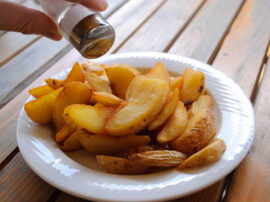I try not to venture into the kitchen too often, in the spirit of “knowing my place.” Inevitably, however, I occasionally find myself drawn to the spice cabinet, opening it up and reaching for…that’s right, you guessed it – the salt. Have you ever stopped to consider why the salt container is usually significantly larger than the other spice bottles? Most likely because it is used far more often than the rest of the cabinet’s contents. Why is that? What is so unique about salt?
This week’s Torah portion, Vayikra, sets forth many of the intricacies involved in the offerings that were brought in the Tabernacle, and later in the Holy Temple. The details are indeed myriad, with each offering consisting of its own ingredients and ceremony. One’s head can spin from trying to make sense out of the particulars of the sacrifices. Although, as a practical matter, we don’t bring offerings today, there are still lessons that one can glean from the details that are very relevant to life in the twenty-first century.
Let us study one of these lessons. This is my personal favorite.
The Torah describes the ingredients of the meal offering, which was made up of flour and offered by the poor who could not afford to purchase animals for offerings. The Torah states, “Any meal offering that you offer to G-d shall not be prepared leavened…or
[with]
any honey.” (Leviticus 2:11) This limitation on ingredients means that the flour offering was necessarily pretty simple. However, two verses later, the Torah states, “You shall salt your every meal offering with salt; you may not discontinue the salt of your G-d’s covenant from upon your meal offering – on all your offerings shall you offer salt.” Now, the Torah is telling us that the meal offering, as well as any other offering, must contain salt. This seems a bit puzzling. What is it about salt that causes the Torah to takes such a strong stand, demanding its inclusion, as opposed to any leavening agent or honey, which the Torah forbids?
Rabbi Mordechai Gifter (1915-2001), one of the greatest rabbis and thinkers of our time, offered a profound understanding of this concept. The difference between salt and honey or leavening agents is that the latter are outside factors that change the nature of the food to which they are added. Salt, on the other hand, not only doesn’t alter, but enhances and brings out the food’s natural flavor. This difference, explains Rabbi Gifter, is underscored in the context of an offering to teach us a great lesson in spiritual growth. The basic purpose of an offering is to help one become spiritually closer to G-d. The Hebrew word for an offering, korban, has in its root meaning the word karov, which means to come close. The ingredients of the meal offering reinforce this concept. In striving to come close to G-d, one needs to apply the “salt” approach rather than the “honey” approach. Just like salt brings out a food’s natural flavor, so too should one look to bring out one’s own capabilities, seeking to grow spiritually based on the unique traits of one’s own nature. Honey, on the other hand, makes something sweet that is not naturally sweet. So too, one should not try to be someone he or she is not. One should focus on his or her natural strong points and not to try to imitate others. One should not think, “If only I had that person’s intellect or that person’s assets…” Rather, our very innate characteristics are what G-d expects us to use to come closer to Him and to reach our fullest spiritual potential.
So the next time you say, “Pass the salt, please,” think to yourself, “Let me take the lesson of the salt, and may G-d grant me the divine wisdom to realize the potential that I naturally possess, and may I merit to grow spiritually in the greatest way that I can, with the natural capabilities that He put within me.”

